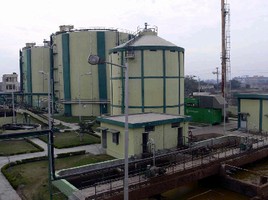Ge Energy's Jenbacher Biogas Engine Powers Cow Manure Methane-to-Energy Plant in India

GE's ecomagination-Certified Technology Generates Power and Heat, Reduces Emissions
NEW DELHI, INDIA - February 20, 2007 - A GE Energy Jenbacher biogas engine is powering a successful demonstration cattle manure-methane cogeneration plant at a large dairy complex in India's northwestern state of Punjab, helping to address the region's mounting energy and environmental needs.
The Jenbacher biogas plant was cited as one of a number of successful GE projects during the formal launch of GE's ecomagination program in India on February 20 in New Delhi. Ecomagination is GE's commitment to address challenges such as the need for cleaner, more efficient sources of energy, reduced emissions and abundant sources of clean water.
Since late 2004, GE's 1-megawatt (MW) Jenbacher biogas cogeneration system has supported the model waste-to-energy conversion plant at the Haebowal dairy complex in the city of Ludhiana. The 50-acre Haebowal complex, one of two centralized cattle facilities in Ludhiana, serves 1,490 dairy operations that own 150,000 head of cattle, generating a total 2,500 tons of manure daily. GE's Jenbacher demonstration project uses the biogas with high methane content created during the anaerobic digestion of 235 tons of cow manure per day to generate electricity and thermal power (hot water).
In order to reduce the facility's greenhouse gas emissions (methane has 21 times the greenhouse warming potential as carbon dioxide) and to prevent the improper disposal of the animal wastes, the Punjab Energy Development Agency (PEDA) installed and commissioned this demonstration power generation facility based on the biomethanation process of cow manure. PEDA is the state government nodal agency for renewable energy projects in Punjab under the financial and technical support of the Ministry of New and Renewable Sources, Government of India.
Surplus energy remaining after meeting the plant auxiliary requirements from the engine is sold to the local grid of Punjab State Electricity Board (PSEB), while water heated by the engine is used to assist the digester fermentation process. In addition to the energy and thermal output of the plant, remnants of the digester process are used as fertilizer by local farmers.
"We are very pleased with the results of this biomethanation facility to mitigate the environmental impacts from such a large concentration of cattle in one area," said Shri M.P. Singh, Senior Project Manager of PEDA. "Expanding the recycling of cow manure for energy and fertilizer, while simultaneously improving our air and water quality, is clearly within our mission to promote a sustainable energy future. We are increasingly looking for possibilities of establishing more such plants in the state of Punjab."
"A critical priority for rural regions throughout the world is to replace inefficient waste disposal and fuel-burning practices, which can have negative impacts on the environment, with newer, more efficient energy technologies including GE's Jenbacher biogas systems," said Prady Iyyanki, CEO of GE Energy's Jenbacher gas engine business. "We expect the Haebowal demonstration project to spur other dairy customers to install similar systems that will greatly mitigate the environmental impacts of their operations."
Clarke Energy India Private Ltd., a wholly owned subsidiary of England-based parent
Clarke Energy Ltd., longtime UK distributor and service provider for GE Energy's gas engines, supplied the Jenbacher JMC 320 GS-B.L unit as part of its turnkey solution for the project. Entec Biogas GmbH of Austria provided the biogas digester system to PEDA.
In 2006, GE announced its Jenbacher biogas application had received GE's ecomagination certification after completing the company's rigorous environmental and operational evaluation.
GE Energy's Jenbacher gas engine business is a leading manufacturer of gas-fueled reciprocating engines, packaged generator sets and cogeneration systems for power generation. GE's Jenbacher gas engines run on natural gas or a variety of specialty waste gases, including biogas, landfill and coal mine methane and industrial waste gases.
About GE Energy
GE Energy (www.ge.com/energy) is one of the world's leading suppliers of power generation and energy delivery technologies, with 2006 revenue of $19 billion. Based in Atlanta, Georgia, GE Energy works in all areas of the energy industry including coal, oil, natural gas and nuclear energy; renewable resources such as water, wind, solar and biogas; and other alternative fuels.
Numerous GE Energy products are certified under ecomagination, GE's corporate-wide initiative to aggressively bring to market new technologies that will help customers meet pressing environmental challenges.
As part of GE's ecomagination initiative GE Energy is constantly focusing on expanding the fuel capabilities of its equipment. GE's Jenbacher engines operating on waste gases provide environmental benefits while providing customers with a technology that can generate carbon credits in certain regions. GE's carbon monetization team provides assistance to our customers in assessing whether monetization opportunities are available to further reduce the operating cost of power generation.
Serena Levy
GE Energy
+1 678-844-5423
serena.levy@ge.com



